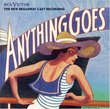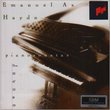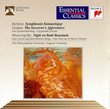| All Artists: Beethoven, Berlin Phil Orch, Pfitzner Title: Symphonies 3 & 8 Members Wishing: 0 Total Copies: 0 Label: Naxos Release Date: 7/18/2000 Genre: Classical Styles: Historical Periods, Classical (c.1770-1830), Modern, 20th, & 21st Century, Symphonies Number of Discs: 1 SwapaCD Credits: 1 UPC: 636943191026 |
Search - Beethoven, Berlin Phil Orch, Pfitzner :: Symphonies 3 & 8
 | Beethoven, Berlin Phil Orch, Pfitzner Symphonies 3 & 8 Genre: Classical
|
Larger Image |
CD DetailsSimilarly Requested CDs
|
CD ReviewsNaxos' New View of an Old View of Beethoven Thomas F. Bertonneau | Oswego, NY United States | 10/03/2000 (4 out of 5 stars) "Beethoven's "Eroica" in a 1929 performance under the baton of Hans Pfitzner, a conductor better known today as the composer of the opera "Palestrina," is, of course, an item for collectors. Except... Except that, in offering this and other archival performances as part of their "Great Conductors" series, and at a budget price, Naxos makes it an option for curious non-aficionados - music-lovers who do not assiduously pursue and acquire material transferred from 78rpm acetate-masters or primitive magnetic-tape sources. What are the "non-connoisseur" reasons for exploring this release? Let me be personal, in the hope that the subjective can, given the right articulation, become the objective. The "Eroica" fascinates me; clearly it represents a quantum-leap in the conception of the symphony. No single reading could ever possibly exhaust the deep well of this profound work. So one seeks as many views, or "soundings" rather, as possible. I suppose that I started out thirty years ago with Bernstein or maybe Bruno Walter, in stereo, naturally. Over the years, I have gotten to know a great raft of "Eroicas," moving slowly backwards along the time-line into the domains of Furtwängler, Abendroth, Knappertsbusch, and Kleiber. One thing that one learns by such musical time-traveling is how approaches change, how different the gutsy, romantic "Eroicas" of the German mid-century differ from the smoother, cooler Beethoven of recent decades. Pfitzner's is not the earliest "Eroica" on disc, but it is one of the earliest. It benefits, having been cut in 1929 (with the Berlin Philharmonic no less), from the technology of electrical recording. I want to emphasize that, as techno-enthusiasts and espousers of digital recordings very nearly indistinguishable from live performance, we suffer from a prejudice. I argue to my friends that the old records are not, in fact, "inferior" in sound, but merely different, and that it is possible to enjoy the warmth and naturalness of the old acetate masters on their own terms. Pfitzner was Furtwängler's mentor and occupied a fairly central position among German conductors in the first two decades of the century. His "Eroica" is rather fast, but it is full of fire. This type of interpretation lies at the extreme opposite pole of the "period" performances of Norrington and Hogwood; yet it is not quite in the colossal pattern of Furtwängler or Knappertsbusch. Pfitzner's contunuous modifications of tempo within each movement will at first seem odd, but with repeated auditions their logic becomes manifest. Naxos also gives us, on the same disc, Pfitzner's 1933 Eighth Symphony, also with the BPO. Give this a chance and you will never listen to modern recordings of the "Eroica" the same way again."
|

 Track Listings (8) - Disc #1
Track Listings (8) - Disc #1![Vivaldi's Ring of Mystery [With CD]](https://nationalbookswap.com/cd//m/30/0730/80730.jpg)








